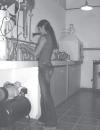Resumo
Busca entender las causas que determinaron el surgimientode la ciencia de la conservación solamente un tiempodespués del despertar de la conciencia de la preservación Establece que el conocimiento científico es imprescindibleen la conservación de la materia que forma los artefactosde interés cultural. Muestra los primeros movimientos europeosen busca de la conservación científica de los objetos dearte y sus principales protagonistas. Y trata sobre la formaciónsistemática de los conservadores-restauradores en Brasily como se ha desarrollado hasta hoy, destacando el papelde la investigación en esta formación.Se resalta el importante papel que las universidades puedenrepresentar, especialmente en los países en desarrollo,como por ejemplo la Universidad Federal de Bahía y con suprograma de posgrado en restauración y conservación demonumentos y sitios históricos y en especial el Núcleo deTecnología de Preservación y Restauración.La revista Apuntes se encuentra registrada bajo la licencia Creative Commons Reconocimiento 4.0 Internacional. Por lo tanto, esta obra se puede reproducir, distribuir y comunicar públicamente en formato digital, siempre que se reconozca el nombre de los autores y a la Pontificia Universidad Javeriana. Se permite citar, adaptar, transformar, autoarchivar, republicar y crear a partir del material, para cualquier finalidad (incluso comercial), siempre que se reconozca adecuadamente la autoría, se proporcione un enlace a la obra original y se indique si se han realizado cambios. La Pontificia Universidad Javeriana no retiene los derechos sobre las obras publicadas y los contenidos son responsabilidad exclusiva de los autores, quienes conservan sus derechos morales, intelectuales, de privacidad y publicidad.
El aval sobre la intervención de la obra (revisión, corrección de estilo, traducción, diagramación) y su posterior divulgación se otorga mediante una licencia de uso y no a través de una cesión de derechos, lo que representa que la revista y la Pontificia Universidad Javeriana se eximen de cualquier responsabilidad que se pueda derivar de una mala práctica ética por parte de los autores. En consecuencia de la protección brindada por la licencia de uso, la revista no se encuentra en la obligación de publicar retractaciones o modificar la información ya publicada, a no ser que la errata surja del proceso de gestión editorial. La publicación de contenidos en esta revista no representa regalías para los contribuyentes.


